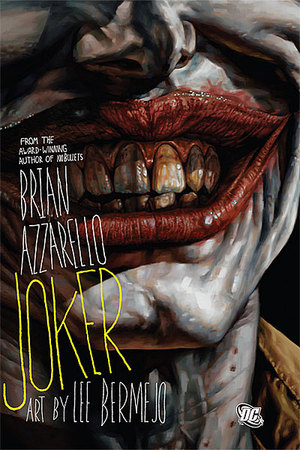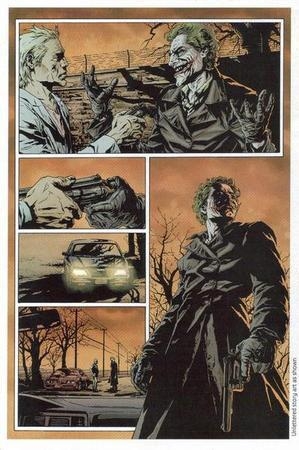Joker
By Zak Edwards
November 8, 2008 - 17:45
DC Comics
Writer(s): Brian Azzarello
Penciller(s): Lee Bermejo
Inker(s): Mick Gray & Lee Bermejo
Colourist(s): Patricia Mulvihill
Letterer(s): Robert Clark
Cover Artist(s): Lee Bermejo
ISBN: 9781401215811
$19.99 US
Joker, the latest graphic novel telling a story completely dedicated to a character recently gaining much more mainstream attention thanks to a certain summer blockbuster film, is nothing short of an incredible accomplishment. To say the graphic novel is the best Joker story ever is absurd given the sheer amount of stories dedicated to the Clown Prince of Crime, but to say the story is amazing in its own right is a fair statement. Writer Brian Azzarello and artist Lee Bermejo combine their talents to craft a story that is both horrifying, challenging, and, most importantly, almost devoid of the Batman. On a side note, this graphic novel is not recommended for our junior comic book readers as this comic book contains a large amount of violence and disturbing imagery even a full grown adult could find seriously offensive and scary. But this amount of grotesque imagery both aids and harms the story.
 |
A major talent in this story is Azzarello’s ability to have a very diverse cast of some of Batman’s most notorious criminals without the whole story coming off like a bad super hero video game where they try to cram in as many bad guys as possible. There are appearances by Killer Croc, the Penguin, the Riddler, Two-Face, and others but this is done naturally and not forced, aiding the central story over plopping them in for a more diverse cast. Seeing these characters interact with the Joker is aided by the story’s narrator and arguably central character, Jonny Frost. The important thing about Jonny Frost is he is not Batman, and therefore readers are allowed to see these interactions between villains on an entirely different level, both morally and in amount of content. Where a normal Batman or Detective Comics would show smaller scenes of this, the narration never breaks from Jonny and therefore readers can see these things happen in great detail.
 |
Lee Bermejo’s pencilling and the combined efforts of him and Mick Gray create a book that both reads well and looks great. While the art may not be the most aesthetically pleasing because of the content, Bermejo works within his constraints to present some of Azzarellos most twisted thoughts into images which make readers stop in their tracks. While the look of the Joker himself, with the Glaswegian Smile scars up his face, is similar to the movie from earlier this year, I do not see this as a negative thing. The image of the scarred face works, whether it was used to draw attention from the film’s fans or not. Bermejo argues he drew the Joker that way before he saw pictures of Heath Leger’s Joker, but I feel this to is inconsequential. If the story is seen as part of the same continuity as Christopher Nolan’s films, then this graphic novel serves to alleviate some of the more ironic lines said in The Dark Knight. Leger’s “Destined to do this forever” speech is a powerful one now, as the Joker is seen back in Gotham, back in his fight against the city and its protectors. The story brings a better conclusion to the general disappointment felt at Leger’s death and the continuation of such a legendary performance.
Two lines on the Joker’s face aside, Bemejo’s interpretation is still powerful. The inking duties have been split between himself and Mick Gray, whose vastly different styles perform wonders in the story. Bermejo limits the pages he does to those with a great impact; the first full-page, full shot of the Joker, a lot of his welcoming party at a strip club, and a lot of the final pages of the novel, most notably an extreme close-up shot of the Batman’s face to juxtapose the cover. These pages carry an extra weight to them and can be seen as visible markers of the narration of the story. But Mick Gray’s inking allows for a rougher feel to the bulk of the story. His inking allows for things the polished look of Bermejo’s couldn’t, like the heavy shading associated with Two-Face or the extreme blood involved in ssome of the Joker’s more extreme bouts of violence.
9.5/10 A contemporary classic that will be recognized as important today and years from now.
Related Articles:
Joker Review
Review: Harley Loves Joker #2
Review: Harley Loves Joker #1
DC reveals a new Joker design meant to be kept under wraps
“The kind of mind The Joker attracts” or Evil Enabled?
John DiMaggio provides the sinister voice of The Joker in "Batman: Under the Red Hood"
Who Was the Best Joker?
The Joker Fan Made Music Video
Joker
Ray Wall Band Brings You, "The Joker"
